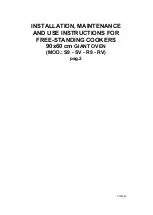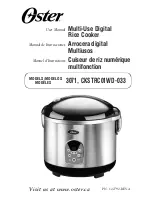
Cookware
The bottom of the cookware must be
as thick and flat as possible.
Cookware made of enamelled steel
and with aluminium or copper
bottoms can cause the colour
change on the glass-ceramic
surface.
Energy saving
• If it is possible, always put the lids on the
cookware.
• Put cookware on a cooking zone before you
start it.
• Use the residual heat to keep the food warm
or to melt it.
• The bottom of the pans and cooking zones
must have the same dimension.
Examples of cooking applications
Heat
set-
ting:
Application:
1
Keeping warm
2
Gentle simmering
3
Simmering
4
Frying / browning
5
Bringing to the boil
6
Bringing to the boil / quick frying /
deep-frying
Hob - Care and cleaning
WARNING!
Refer to Safety chapters.
General information
• Clean the hob after each use.
• Always use cookware with clean bottom.
• Scratches or dark stains on the surface have
no effect on how the hob operates.
• Use a special cleaner applicable for the
surface of the hob.
• Use a special scraper for the glass.
Cleaning the hob
• Remove immediately: melted plastic,
plastic foil, and food with sugar. If not, the
dirt can cause damage to the hob. Put the
special scraper on the glass surface at an
acute angle and move the blade on the
surface.
• Remove when the hob is sufficiently
cool: limescale rings, water rings, fat stains,
shiny metallic discoloration. Clean the hob
with a moist cloth and some detergent. After
cleaning, rub the hob dry with a soft cloth.
Oven - Daily use
WARNING!
Refer to Safety chapters.
Cooling fan
When the appliance operates, the cooling fan
activates automatically to keep the surfaces of
the appliance cool. If you deactivate the
appliance, the cooling fan can continue to
operate until the appliance cools down.
8
www.zanussi.com






































